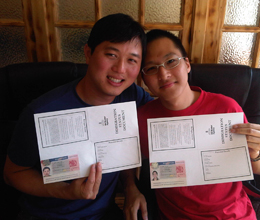Source: Free Malaysia Today
By Teoh El Sen
PETALING JAYA: Two Malaysian men successfully claimed refugee status in the UK on grounds that they are gays last month despite the low success rates of such claims based on sexual orientation.
The UK had granted the status to the duo -- Seow Shih Yung, 30, from Penang and Wong Yu Xiu, 25, from Petaling Jaya – based on their fear of persecution on grounds of their sexual orientation.
Under Section 377 of the Malaysian Penal Code, in an offence classified as "carnal intercourse against the order of nature", a convicted person may be punished with imprisonment of up to 20 years and also liable to fine or whipping.
"Both were in a homosexual relationship while in Malaysia, and moved to the UK because they feared that they were not able to practise homosexual relationship openly," said their lawyer Uma Devi Rajasundram.
Uma Devi said Seow and Wong went to the UK on a working holiday visa and the former had overstayed and became an illegal.
Seow was caught while working at a Chinese takeaway restaurant in Bristol, Wales. He then claimed asylum at a detention centre as he is a gay and unable to practise homosexual relationships openly in Malaysia.
"Wong then voluntarily claimed asylum on the same ground as he is Seow’s partner," said Uma Devi.
Seow and Wong were granted asylum in early August 2010.
Between 2005 and 2009, the British Home Office had initially refused 98% of all claims for asylum from gays or lesbians, Uma Devi said, quoting a rights group Stonewall in its recent "No Going Back" report.
“In the past, it was very difficult for social groups such as lesbians, gays, bisexuals or transgenders to claim asylum based on fears of persecution (in their home country). It was hard for them to argue and win even with substantial evidence of ill-treatment," said Uma Devi.
The United Nations 1951 Convention on the Status of Refugees provides that members of social groups are entitled to asylum in states that are parties to the convention if they can establish a well-founded danger or fear of persecution if they returned to their home country.
The House of Lords, in a recent test case, had unanimously allowed appeals from two gays, from Cameroon and Iran, against the decision of British officials who had earlier rejected their request for asylum because the former said they could hide their sexuality by behaving discreetly, said Uma Devi.
"The justices said the UK Immigration Tribunal should in future decide whether an applicant was gay and whether he would face persecution if he lived openly in his own country. If this evidence can be established, then the applicant would have a well-founded case for asylum.”
By Teoh El Sen
PETALING JAYA: Two Malaysian men successfully claimed refugee status in the UK on grounds that they are gays last month despite the low success rates of such claims based on sexual orientation.
The UK had granted the status to the duo -- Seow Shih Yung, 30, from Penang and Wong Yu Xiu, 25, from Petaling Jaya – based on their fear of persecution on grounds of their sexual orientation.
Under Section 377 of the Malaysian Penal Code, in an offence classified as "carnal intercourse against the order of nature", a convicted person may be punished with imprisonment of up to 20 years and also liable to fine or whipping.
"Both were in a homosexual relationship while in Malaysia, and moved to the UK because they feared that they were not able to practise homosexual relationship openly," said their lawyer Uma Devi Rajasundram.
Uma Devi said Seow and Wong went to the UK on a working holiday visa and the former had overstayed and became an illegal.
Seow was caught while working at a Chinese takeaway restaurant in Bristol, Wales. He then claimed asylum at a detention centre as he is a gay and unable to practise homosexual relationships openly in Malaysia.
"Wong then voluntarily claimed asylum on the same ground as he is Seow’s partner," said Uma Devi.
Seow and Wong were granted asylum in early August 2010.
Between 2005 and 2009, the British Home Office had initially refused 98% of all claims for asylum from gays or lesbians, Uma Devi said, quoting a rights group Stonewall in its recent "No Going Back" report.
“In the past, it was very difficult for social groups such as lesbians, gays, bisexuals or transgenders to claim asylum based on fears of persecution (in their home country). It was hard for them to argue and win even with substantial evidence of ill-treatment," said Uma Devi.
The United Nations 1951 Convention on the Status of Refugees provides that members of social groups are entitled to asylum in states that are parties to the convention if they can establish a well-founded danger or fear of persecution if they returned to their home country.
The House of Lords, in a recent test case, had unanimously allowed appeals from two gays, from Cameroon and Iran, against the decision of British officials who had earlier rejected their request for asylum because the former said they could hide their sexuality by behaving discreetly, said Uma Devi.
"The justices said the UK Immigration Tribunal should in future decide whether an applicant was gay and whether he would face persecution if he lived openly in his own country. If this evidence can be established, then the applicant would have a well-founded case for asylum.”

No comments:
Post a Comment